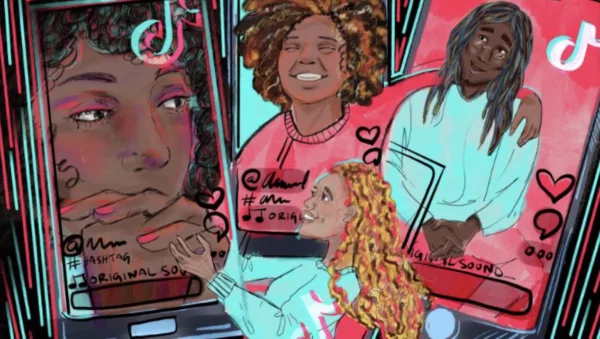From a well-lighted room, the plants blurred in the background, their face framed by closed captioning, Shahem Mclaurin speaks directly into the camera. The lesson: “Ten ways to start healing.”
But this is not a classroom, nor is it a therapist’s office. This is TikTok.
“We all have our own things to carry, and those burdens shouldn’t be carried with us for the rest of our lives,” says Mclaurin, a licensed social worker.
Through videos — some on topics like grief, “race/race-ism,” trauma and healing, others raw reactions or trending sounds, like this call to action to amplify people of color on TikTok — Mclaurin advocates for better representation in the mental health field. Mclaurin speaks to viewers who haven’t found caregivers they connect with because of stigmas surrounding therapy and acknowledges that few practitioners look like them.
“I am a Black, queer therapist, and I want to showcase myself being fully that,” Mclaurin said. “I always say, ‘My durag is part of my uniform.'”
Mental health professionals have soared in popularity on TikTok, addressing a wide swath of mental health conditions, reacting to the racial trauma from charged events like the trial of Derek Chauvin for George Floyd’s murder and the January 6 insurrection, and bringing humor to sensitive issues like depression that for some communities remain hushed. On TikTok, Black therapists talk openly about working in a predominantly White field, while at the same time making mental health care more accessible for people who might be shut out of the health care system.
The Chinese-owned video app, with its U.S. headquarters in Culver City, California, provides a massive platform and even the potential for fame, with more than 1 billion monthly users. The hashtag #mentalhealth has racked up more than 28 billion views, alongside others like #blacktherapist and #blackmentalhealth that attract audiences of millions.
Video production has ballooned into a main job for Kojo Sarfo, a psychiatric mental health nurse practitioner living in Los Angeles, who has pulled in 2 million followers. Sarfo dances and acts out short skits about attention deficit hyperactivity disorder, eating disorders and other mental health conditions.
“I try to lighten topics that are very difficult for people to talk about,” he said. “And to let people know that it’s not as scary as you would think to go get help.”
Mental health professionals can run the gamut of medically trained psychiatrists to psychologists with doctorates to mental health counselors with master’s degrees. Although diversity is improving in the field — Black professionals make up 11% of psychologists younger than 36 — just 4% of the overall US psychologist workforce are Black, according to the American Psychological Association’s most recent data. More than three-quarters of mental health counselors are White.
Patrice Berry, a psychologist from Virginia, mostly uses TikTok to respond to people’s questions about things like tips for new therapists and setting boundaries with teens. Berry isn’t there to find clients. She has a waitlist at her private practice. She said TikTok is a way to give back.
Her comments sections are an outpouring of largely appreciative notes and follow-up questions, with some videos getting more than a thousand replies.
In one TikTok, Berry jokes about abruptly leaving a church when “they say you don’t need therapy or medication.” One user commented that was how she was raised in her Black Baptist church and that “we have so much unlearning and relearning to do.” Another wrote, “As a therapist I love this. Preach!”
A tightknit TikTok community has formed, and Berry spearheaded a Facebook group dedicated to Black, Indigenous and other people of color focused on mental health.
“I wanted to create a safe space for us to be able to have real conversations about our experiences on the app and to share tips and resources,” she said.
Therapist Janel Cubbage’s video topics range from evidence-based strategies for preventing suicides on bridges to collective trauma, sometimes addressing her Black audience directly.
Like other TikTokers, she is quick to note that watching videos is not a substitute for seeking professional help and that important concepts can get lost in the scrolling. Plus, even as TikTok works to identify and remove inaccurate information, creators without mental health degrees are going viral discussing similar issues without the expertise or training to back up their advice.
When dealing with trolls, Cubbage said, the emotional support from creators she’s met on TikTok is indispensable. “That’s been one of the really neat things about the app is finding this community of Black therapists that have become like friends to me,” she said.
Unlike Facebook, which relies largely on a user’s friends and followers to populate the feed, TikTok’s algorithm, or “recommendation system,” has a heavy hand in what people see. When a user engages with certain hashtags, the algorithm pushes similar content, said Kinnon MacKinnon, an assistant professor at York University in Toronto who has researched the app. At the same time, TikTok does heavily moderate content that does not abide by its community guidelines, suppressing pro-eating disorder hashtags like #skinnycheck, for instance.
Click here to read the full article on CNN.



